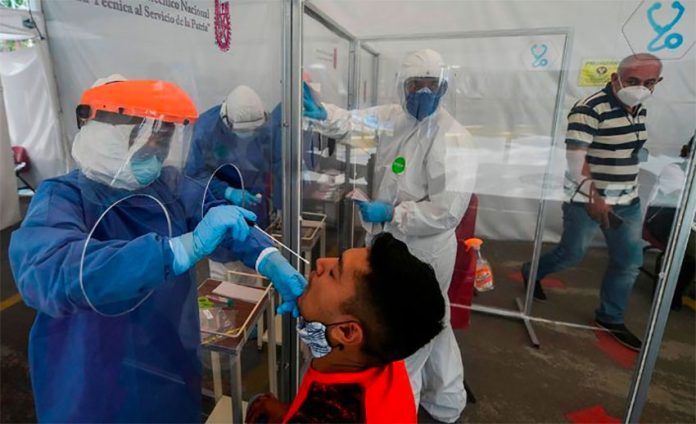The federal government is not interested in testing Mexicans en masse for Covid-19 because doing so would be “useless, impracticable and very expensive,” Deputy Health Minister Hugo López-Gatell said on Wednesday.
He also said that testing all Mexicans for the infectious disease would be “a waste of time, effort and resources.”
“We’re not interested … [in testing] the 130 million people who live in Mexico,” the deputy minister said during a virtual appearance before federal senators.
López-Gatell, the federal government’s coronavirus czar, said that a false perception has developed that Mexico is the only country in the world that has not identified all coronavirus cases within its borders.
However, “nobody knows” how many cases they have in their country, he said, adding that “this should never be interpreted as a phenomenon of deliberate negligence or incompetence.”
His remarks came in response to a question posed by a ruling party senator.
“Why are you applying 0.4 tests per 1,000 inhabitants [the rate is now 1.9] when the [OECD] average is 22?” asked Morena’s Ricardo Monreal.
“That could have created a significant underreporting of infections,” he charged.
Alejandra Reynoso of the National Action Party (PAN) pursued an even more aggressive line of questioning.
“Aren’t you ashamed that we’re the country that has applied the least tests?” she asked López-Gatell. “Where does this controversial decision leave us in the [eyes of] the world?”
The deputy minister dismissed the questions, telling Reynoso that she has “scant familiarity” with the public health system.
Other PAN senators protested silently during López-Gatell’s virtual appearance by wearing face masks emblazoned with the word “tests.”
The government had already come under fire for not testing more widely for coronavirus, especially in the lead-up to the gradual reopening of the economy starting June 1.
Reopening the economy without widespread Covid-19 testing is “irresponsible” and will cause Mexico to “lose control” of the pandemic for a second time, former Health Minister Julio Frenk said last week.
The International Labor Organization (ILO) is also advocating for more testing. It said in a new report that rigorous testing and tracing (TT) of Covid-19 infections “is strongly related to lower labor market disruption … [and] substantially smaller social disruptions than confinement and lockdown measures.”
In countries with strong testing and tracing, the average drop in working hours is reduced by as much as 50%, the ILO said.
“There are three reasons for this: TT reduces reliance on strict confinement measures; promotes the public confidence and so encourages consumption and supports employment; and helps minimize operational disruption at the workplace,” the organization said.
“The estimated average loss of hours for countries with the lowest intensity of testing and tracing is around 14%, compared with 7% for those with the highest intensity. This is an important factor to consider in the design of policy measures aimed at facilitating a safe return to work.”
The ILO also said that “testing and tracing can itself create new jobs, even if temporary, which can be targeted towards youth and other priority groups.”
Source: El Universal (sp), El Economista (sp)
